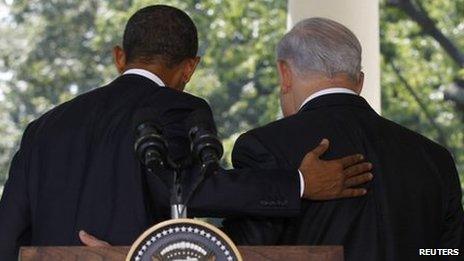When Obama meets Netanyahu...
- Published
- comments

When President Barack Obama meets Israeli Prime Minister Benjamin Netanyahu both must hope the atmosphere is more comfortable, external than their last White House encounter., external
Let's face it, it could hardly be worse. Then the Israeli PM lectured, external the American president on Israel's borders as if he were a naive ingenu. He gave every indication that is exactly what he thought of him.
President Obama listened, looking impatient and testy, unused to such treatment. He now says their relationship is "very functional", while noting they come from different political traditions. At least he didn't claim any warmth.
The two men have different approaches to the foreign policy issue that is at the top of the West's agenda: how to stop Iran from getting nuclear weapons.
President Obama's speech to the American-Israel Public Affairs Committee on Sunday was a very carefully calibrated balancing act. He managed to admonish the Israeli government, without offending the strongly pro-Israeli audience.
How did he manage this? He made his strongest declaration to date that a nuclear-armed Iran was unacceptable.
"Let's begin with a basic truth that you all understand: no Israeli government can tolerate a nuclear weapon in the hands of a regime that denies the Holocaust."
He made his objectives clear: "Iran's leaders should know that I do not have a policy of containment; I have a policy to prevent Iran from obtaining a nuclear weapon."
He made his toughest declaration yet that the US military could be used against Iran: "That includes all elements of American power... Yes, a military effort to be prepared for any contingency... I will not hesitate to use force when it is necessary to defend the United States and its interests".
Not surprisingly these tough declarations struck the audience and made the headlines. That softened his overall message that the time for war was not yet at hand.
He appeared to rebuke the Israeli government, which has not discouraged reports that it could strike Iran this year, for sabre rattling.
"I would ask that we all remember the weightiness of these issues; the stakes involved for Israel, for America, and for the world. Already, there is too much loose talk of war. Over the last few weeks, such talk has only benefited the Iranian government, by driving up the price of oil, which they depend upon to fund their nuclear programme.
"For the sake of Israel's security, America's security, and the peace and security of the world, now is not the time for bluster; now is the time to let our increased pressure sink in, and to sustain the broad international coalition that we have built."
His argument is that sanctions are working and may well persuade Iran to give up its nuclear ambitions. Military action, he says, is on the table, but it comes at the end of the road, not now, not before the election.
The argument between BO and Bibi is not really about the pros and cons of war. It is about how you define success. Or failure. What are the red lines that must not be crossed?
Mr Obama notes pointedly that "the United States and Israel both assess that Iran does not yet have a nuclear weapon," for that is his red line.
Israel's red line, and that of many speakers at the conference, is different.
It is when Iran has enough enriched uranium to build a bomb, something that could happen much sooner than putting the whole thing together.
This time there may be no public frostiness, but that is likely to be at the heart of any heated, private debate.